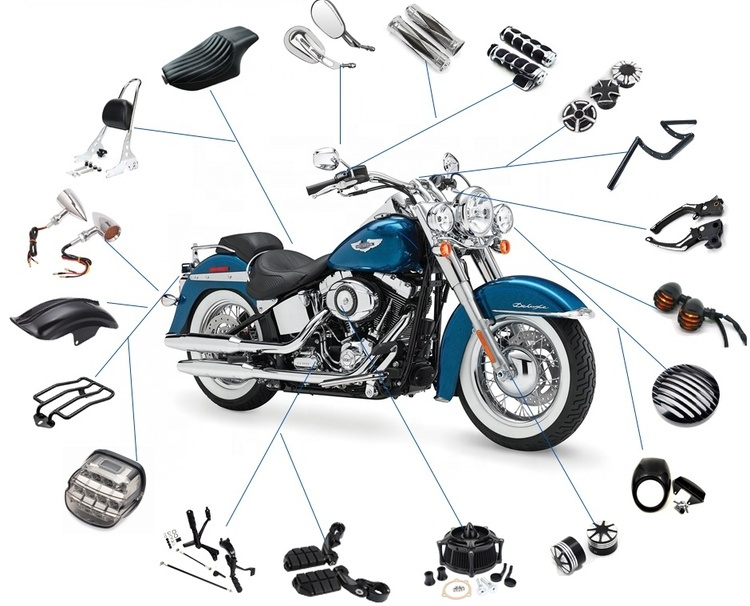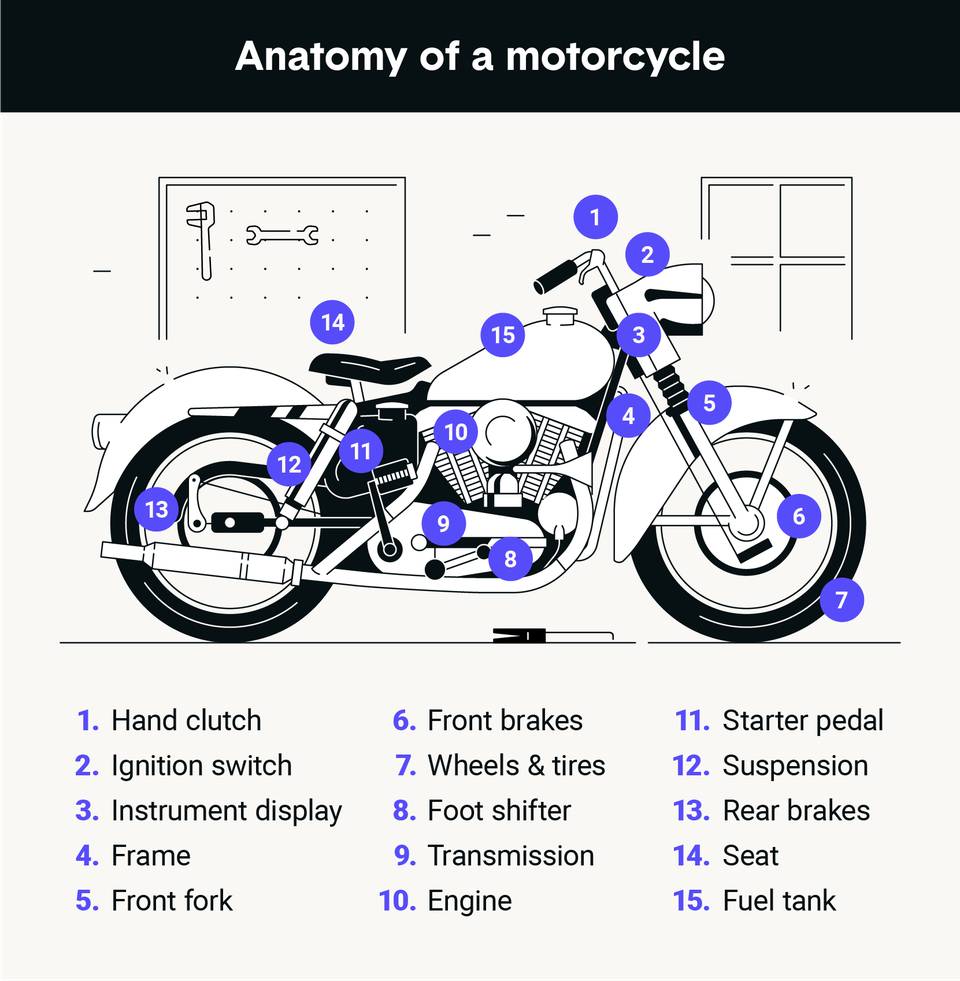Discover the Vital MotorBike Components You Required for Optimum Efficiency
Understanding the crucial parts of a motorbike is essential for achieving peak performance. Each element, from the engine to the stopping system, plays a critical duty in total functionality and security. Normal upkeep can avoid unforeseen failings and boost the riding experience. However, lots of cyclists overlook the ins and outs of these systems. Discovering just how they function together can lead to a much more effective trip. What essential elements should every motorcyclist focus on?
The Engine: The Heart of Your Motorbike
The engine works as the core element of a motorbike, driving its performance and specifying its capabilities. It is responsible for transforming gas into power, which powers the bike ahead. Different kinds of engines are used, including single-cylinder, V-twin, and inline configurations, each offering distinct attributes suited for different riding styles and objectives. The engine dimension, commonly gauged in cubic centimeters (cc), considerably affects efficiency, with bigger engines usually giving even more power and torque.Furthermore, the engine's design and technology, such as fuel shot systems or air-cooling versus liquid-cooling, impact effectiveness and reliability. Upkeep is crucial for peak procedure; variables like normal oil modifications and checking trigger connects guarantee longevity. Motorcyclists commonly think about an engine's responsiveness and smoothness, as these features improve the overall riding experience. Inevitably, the engine continues to be an essential component that defines not only the bike's performance yet likewise the motorcyclist's connection to the machine.
The Transmission: Moving Gears Smoothly
The transmission plays a necessary function in a motorcycle's performance, specifically in the mechanics of equipment moving. Recognizing exactly how to change gears efficiently can enhance the general riding experience, while normal maintenance warranties peak functionality. Correct attention to these facets can considerably influence the durability and performance of the motorcycle.

Equipment Shifting Mechanics
Smooth equipment moving is necessary for perfect motorbike performance, substantially impacting both acceleration and control. The auto mechanics of gear shifting entail the interaction between the clutch, equipment bar, and transmission system. When a motorcyclist involves the clutch, it disengages the engine from the transmission, enabling an equipment change without damaging the parts. A well-timed release of the clutch, integrated with precise motion of the equipment lever, assists in a seamless modification between gears. This process guarantees that the engine operates within its finest power band, enhancing performance. Motorcycle Parts Auckland. Furthermore, recognizing the equipment ratios and their effect on rate and torque can assist cyclists make informed choices throughout changes, inevitably adding to an extra responsive and pleasurable riding experience
Upkeep Tips Relevance
Regular upkeep plays an important role in ensuring that the transmission system operates successfully, enabling smooth equipment shifts. Frequently inspecting and altering the transmission fluid is essential, as old liquid can cause raised rubbing and wear. Furthermore, checking the clutch for wear assurances peak interaction and disengagement, stopping slippage during gear changes. Lubrication of moving components is just as crucial to minimize friction and enhance performance. Motorcycle proprietors need to additionally check for leakages and unusual sounds, as these can suggest underlying problems. By adhering to these upkeep ideas, bikers can prolong the life-span of their transmission system, assuring that gear changes stay seamless and adding to the general performance of their motorcycle.
The Braking System: Ensuring Security on Every Trip
Braking systems are basic elements that directly affect a motorbike's safety and security and performance. They contain numerous components, including brake pads, rotors, calipers, and hydraulic lines, all functioning with each other to assure reliable slowdown. The kind of braking system-- typically either disc or drum-- impacts responsiveness and quiting power.Regular maintenance is necessary to promote peak performance; used brake pads can result in lowered efficiency and increased quiting ranges. Furthermore, the top quality of brake liquid ought to be monitored, as it can soak up wetness over time, jeopardizing stopping efficiency.Riders ought to additionally consider the value of anti-lock stopping systems (ABS), which stop wheel lockup throughout abrupt stops, boosting overall security. Appropriately functioning brakes are not nearly quiting; they infuse confidence in the motorcyclist, permitting safer navigation with numerous surfaces. Inevitably, a trustworthy stopping system is critical for taking pleasure in every ride with comfort.
The Suspension: Enhancing Comfort and Control
A well-functioning suspension system significantly adds to a motorcycle's total efficiency, enhancing the efficiency of the stopping system. The suspension plays a considerable role in absorbing shocks from uneven surface areas, assuring a smoother experience while preserving tire contact with the road. This call is essential for both security and control, enabling bikers to browse corners with confidence and precision.Different sorts of shock absorber, such as telescopic forks or mono-shocks, use varying levels of convenience and handling. Correctly tuned suspension enhances responsiveness, providing the cyclist with a much more connected feeling to the motorbike. Routine maintenance checks are necessary to ascertain the suspension elements, including dampers and springs, are operating at their best. An effective suspension system not just raises the riding experience however also adds to the durability of other motorcycle parts by reducing deterioration. As an outcome, investing in high quality suspension is essential for any type of major motorbike lover.
The Tires: Connecting You to the Roadway
Tires play a crucial function in a motorcycle's efficiency, acting as the main link between the roadway and the biker. Recognizing the different sorts of tires offered can substantially impact taking care of and security. In addition, regular maintenance is essential to guarantee peak tire efficiency and long life.
Tire Types Explained
Exactly how do different tire kinds influence a motorbike's efficiency? Tire kinds play a crucial role in identifying a motorcycle's stability, handling, and hold. Sporting activity tires, designed for high performance, offer improved grip and responsiveness on smooth roadways, making them perfect for racing and hostile riding. Alternatively, touring tires prioritize longevity and comfort, giving a smoother adventure for long-distance traveling. Off-road tires, identified by their sturdy step patterns, master traction on unpaved surfaces, suitable for experience lovers. Furthermore, dual-sport tires mix qualities from both off-road and on-road groups, accommodating versatile riding needs. Ultimately, selecting the best tire type is crucial for optimizing performance, ensuring safety, and enhancing the overall riding experience.
Upkeep Tips Offered
While riding on the road, maintaining ideal tire condition is vital for safety and efficiency. Regularly inspecting tire pressure is very important, as under-inflated tires can lead to poor handling and increased wear. It is suggested to examine walk depth regularly; used tires compromise hold and security. Furthermore, bikers should look for indicators of damage, such as this article cracks or lumps, which can suggest the demand for replacement. Revolving tires occasionally ensures also use, enhancing longevity. Maintaining tires clean from particles and avoiding extreme curbs can lengthen their life expectancy. Preserving correct positioning and see this website balance contributes to come to a head performance, reducing stress on other bike parts. Complying with these maintenance pointers will significantly boost the overall riding experience.
The Gas System: Sustaining Efficiency and Efficiency
The fuel system plays a vital role in maximizing a motorbike's efficiency and performance, as it guarantees the ideal distribution of gas to the engine. It comprises a number of essential components, including the fuel storage tank, fuel pump, fuel filter, and fuel injectors or carburetor. Each part should work properly to assure a smooth and powerful ride.The fuel storage tank shops fuel and provides it to the engine using the gas pump, which generates the necessary pressure. A fuel filter avoids contaminants from going into the engine, while the injectors or carburetor mix fuel with air for combustion.Proper maintenance of the fuel system is essential; a clogged up filter or malfunctioning injector can lead to lowered efficiency and raised fuel consumption. By verifying that the gas system runs efficiently, cyclists can delight in enhanced throttle feedback, much better gas economic climate, and overall improved riding experience.
The Electrical System: Powering Your Experience
An effective electrical system is important for the general performance and safety of a motorcycle, as it powers essential parts such as the ignition, lights, and different digital systems. This system includes the battery, which stores power, and the alternator, liable for producing power while the engine runs. The electrical wiring harness links these parts, look at these guys making sure dependable power distribution.Additionally, integrates safeguard the system from overloads, while relays assist control high-current tools with low-power signals. A well-kept electrical system boosts efficiency by guaranteeing smooth beginnings and regular procedure of lights and signals, vital for cyclist exposure and safety.Regular checks of the battery's fee and connections are crucial for stopping electrical failures. Bikers must also evaluate electrical wiring for damage, guaranteeing all components work ideally. Eventually, a robust electrical system adds considerably to the total performance and dependability of the motorbike.
Often Asked Questions
Just how Commonly Should I Change My Bike's Battery?
The frequency of bike battery replacement depends upon usage and maintenance (Bike Parts Wellington). Usually, batteries ought to be changed every three to five years. Routine checks can aid identify when a substitute is essential for peak performance
What Tools Do I Need for Fundamental Bike Upkeep?
For fundamental bike upkeep, one needs essential tools such as an outlet set, wrenches, screwdrivers, pliers, tire stress gauge, and a torque wrench. These devices help with efficient maintenance and assure the motorcycle runs efficiently and safely.
Just How Can I Boost My Motorcycle's The rules of aerodynamics?
To boost motorcycle aerodynamics, one ought to take into consideration changing fairings, utilizing windshield expansions, maximizing body placement, and lowering total weight. These modifications help minimize drag, enhancing stability and fuel efficiency throughout adventures.
What Are the Indicators of a Failing Electric System?
Indicators of a falling short electric system consist of lowering lights, trouble starting, irregular instrument readings, and blown integrates. Motorbike Components NZ. Uncommon smells or rust around battery terminals may likewise indicate underlying issues requiring prompt focus for safety and efficiency

How Do I Select the Right Oil for My Bike?
When picking oil for a bike, one should consider the producer's specs, thickness rankings, and the kind of riding. Furthermore, synthetic versus standard oil can impact efficiency and engine security, influencing the decision significantly. The engine size, generally measured in cubic centimeters (cc), substantially influences performance, with bigger engines normally offering more power and torque.Furthermore, the engine's design and technology, such as fuel shot systems or air-cooling versus liquid-cooling, affect performance and dependability. A well-functioning suspension system greatly adds to a motorbike's total efficiency, complementing the performance of the braking system. The gas system plays an essential role in taking full advantage of a motorbike's efficiency and efficiency, as it assures the ideal delivery of gas to the engine. A fuel filter avoids contaminants from entering the engine, while the injectors or carburetor mix fuel with air for combustion.Proper upkeep of the fuel system is crucial; a stopped up filter or malfunctioning injector can lead to lowered efficiency and increased fuel usage. A well-kept electrical system enhances efficiency by making sure smooth beginnings and regular procedure of lights and signals, vital for motorcyclist visibility and safety.Regular checks of the battery's fee and links are important for stopping electric failures.
Comments on “Why Riders Prefer Original Motorcycle Parts Auckland Over Aftermarket Brands”